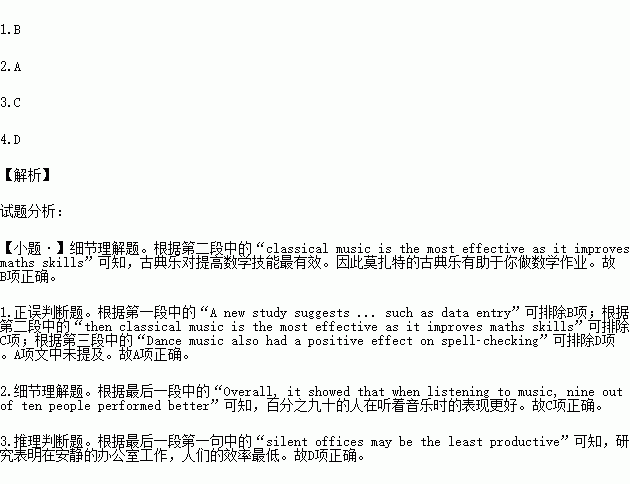题目内容
阅读理解
Whether it is Mozart or Miley, your choice of music could determine whether you will perform well at your job. A new study suggests that listening to music in the office improves the speed and accuracy of tasks such as data entry, proofreading and problem solving. In an office?based experiment, 88 per cent of participants were found to produce their most accurate work when listening to music.
The study also found that 81 per cent completed their work fastest when music was played. And it matters what type of music you listen to. For instance, if you're doing your tax returns, then classical music is the most effective as it improves maths skills.
Listening to Jessie J or Justin Bieber could also improve your speed, with 58 per cent of participants completing data entry tasks faster while listening to pop songs. During proofreading, dance music, such as David Guetta, had the biggest positive impact with participants increasing their speed by 20 per cent compared to tests undertaken with no music at all. Dance music also had a positive effect on spell?checking with a 75 per cent pass rate compared to 68 per cent when no music was played at all.
The research, undertaken by Brighton?based Mindlab International, suggests that silent offices may be the least productive. The Music Works experiment revealed a positive correlation between music and productivity. Overall, it showed that when listening to music, nine out of ten people performed better, said Dr David Lewis, chairman of Mindlab International.
1.Whose music can help you do maths homework according to the study?
A.The music of Justin Bieber.
B.The music of Mozart.
C.The music of David Guetta.
D.The music of David Lewis.
2.Which of the following is NOT mentioned according to the passage?
A.Music makes you relaxed.
B.Music helps you to enter data faster.
C.Music improves maths skills.
D.Music has a positive effect on spell?checking.
3.The result of the experiment showed that when music was played, ________.
A.88% of people worked faster
B.81% of people did their most accurate work
C.90% of people worked better
D.75% of people completed data entry task faster
4.What can we conclude from the passage?
A.Music may be helpless to people in office.
B.Silent offices can make people work better.
C.Different kinds of music have the same effect.
D.Silent offices may make people work least profitably.
 一课一练课时达标系列答案
一课一练课时达标系列答案

